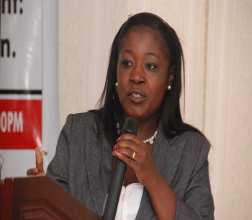Professor Olivia Kwapong, Head of Department, Distance Education, University of Ghana, has challenged graduate students to propound their own theories as a way of measuring their outputs.
She explained that, when graduate students build their own models generate ideas and share innovations it would help change the teaching and learning models adopted in the country over the years and promote positive developmental agenda setting.
"Design your own model, critique the theories, study differently and change your styles of learning to champion the course of the country,” she said.
Prof Kwapong said this at the weekend in Accra at the fourth joint matriculation ceremony for graduate students of the Institute of Local Government Studies (ILGS).
She said the adoption of new approaches in learning is going to make students scholars, innovators and a phenomenal benchmark to Ghana’s development.
“Take initiatives of trying to experiment human resources that will have a turn of approach to the country,” Prof Kwapong said.
The institute admitted 76 students for its four master’s programmes for the 2014/2015 academic year.
Out the total number, 43 students from the Tamale Campus would be reading Environmental Science Policy Management programme, while 14 would be pursuing Local Government Administration and Organisation, with 12 expected to study Local Government Financial Management. The remaining seven would be reading Local Economic Development.
The students made up 63 males and 13 females represent an increase as against the 2012/2013 academic year.
Speaking at the ceremony, Dr Esther Oduraa Ofei-Aboagye, Director, ILGS observed that local government and the delivery of local services and development is changing and becoming more challenging places to work in while patrons ought to be equipped to be pro-active as well as confident agents of change.
In this direction, Dr Ofei-Aboagye stated that ILGS programmes need to manage the delicate balance of academic rigour and relevance and applicability of the content for the work that patrons are doing.
“We intend to harvest the lessons more efficiently by undertaking a comprehensive tracking exercise with our thesis-stage students to better understand what challenges they face in completion”
“This, we believe, will help us to improve and expedite processes,” she added.
She therefore encouraged students to optimise their experiences as ILGS and other established institutions have strengthened their research capacities and investing in considerable resources in analysis that would provide evidence-based knowledge to support national policy making, implementation and monitoring as well as students’ knowledge.
Mr Samuel Okudzeto Ablakwa, Deputy Minister of Education, In-charge of Tertiary Education lauded ILGS for being one of the leading institutions charged with a different norm of training students to serve the local government sector towards the country’s development.
He said going by the enrollment of graduate students, it was a target that 25 per cent institutions would be offering graduate programmes but as it stands now in the country it was only nine per cent offering graduate programmes.
He however called for the attainment of decentralisation as it is the only goal for the country’s education to attain a better recognition.
Mr Ablakwa also called for supervision and monitoring through effective decentralisation for quality future educational sustainability and progress.
Chiana Pio, Pe Ditundini Adiali Ayagitam III, Chairman of the Governing Council of ILGS and Mr Anthony Agyeapong, Registrar Responsible for Affiliation, Kwame Nkrumah University of Science and Technology, advised the students to commerce their studies with the objective of acquiring the needed skills, knowledge and attitude to solve critical societal problems.
Regional News of Sunday, 19 October 2014
Source: GNA
Graduate students must propound their own theories













